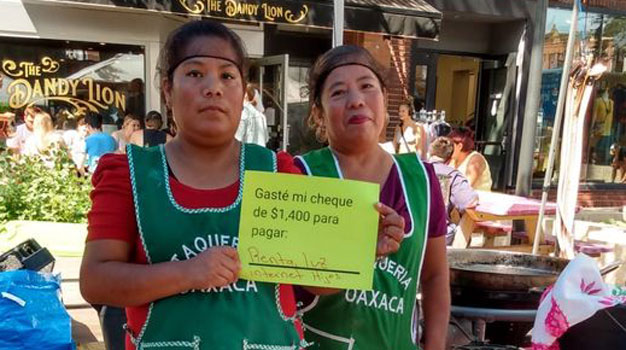
During Iowa City LatinoFest last month, excluded immigrant and essential workers who received a check from the Johnson County Direct Assistance Program reported how they spent the pandemic relief payment. These food vendors planned to spend their money on their children, light, rent and utilities.
By Barb Arland-Fye
The Catholic Messenger
Persistence, community organizing and faith led to a successful effort to grant $1,400 in pandemic relief funds for 2,238 essential and excluded workers who live in Iowa City or one of the other communities in Johnson County.
Photos of smiling essential and excluded workers holding neon-green signs that state how they intend to spend their hard-fought pandemic relief funds appear on the Facebook page of Escucha Mi Voz Iowa. The nonprofit organization seeks to build the power of immigrant and working-class communities to win dignity and justice in society. Iowa City Catholic Worker has been instrumental in guiding Escucha Mi Voz in that effort.
Essential and excluded workers spent months advocating for funding from the federal American Rescue Plan Act (signed into law in March 2021), which provided a third stimulus payment to millions of Americans. ARPA excluded undocumented immigrants, many of whom were among the essential workers who helped keep the economy going during the pandemic.
David Goodner, who co-founded the Iowa City Catholic Worker (ICCW) with Emily Sinnwell, was instrumental in organizing the Fund Excluded Workers Coalition, with Escucha Mi Voz providing the people power to take their cause to the halls of city and county government. They learned that a U.S. Treasury Department official said it is acceptable and appropriate to provide a cash assistance program to “a subset of an eligible population that has been especially impacted by the pandemic or its negative economic effects.”
Through their combined efforts, which began last year, Escucha Mi Voz convinced the Johnson County Board and Iowa City Council to commit, collectively, $3.5 million to give $1,400 stimulus checks to 2,500 local residents negatively impacted by the COVID-19 pandemic.
However, a lottery was established to distribute the money and the Iowa City Council notified the public that only 1,919 people would receive checks; 319 other eligible applicants were left out. Escucha Mi Voz, with the organizing guidance of the Iowa City Catholic Worker, sought to regain funding for the 319.
In a July 15 email post, the Iowa City Catholic Worker community wrote, “How could this happen? … The losers of the convoluted and controversial Direct Assistance Program lottery this week were disproportionately low-wage workers, people of color, immigrants and refugees, vulnerable mobile home owners, and rural residents living outside of urban Iowa City in places like Coralville, North Liberty, Tiffin, Solon, Lone Tree, etc.”
The denial was not for lack of resources, the ICCW stated, because “Iowa City will actually be getting back $690,000 of its $1.5 million commitment, even as hundreds of negatively impacted people are told there’s no more help for them.”
The ICCW advised its supporters to take action to change hearts and minds. “Send an email to the Joint Entities and urge them to spend the money they already committed to this project. Dozens of excluded workers, mobile home owners, and rural residents are standing up and speaking out about the economic hardship they will endure if they do not receive the pandemic relief promised to them.”
On July 30, the ICCW hosted a listening session with Iowa City Mayor Pro Tem Megan Alter, City Councilor John Thomson, human rights commissioners and 20 excluded immigrant workers at the downtown Catholic Worker House in Iowa City. On Aug. 17, the ICCW reported positive news, in a jubilant email:
“Today’s Gospel reading is a powerful parable about God’s preferential option for the poor. It is a fitting reading this morning because last night, the Iowa City Council put the last first and voted unanimously to fully fund the remaining 319 negatively impacted Johnson County residents who did not receive a Direct Assistance Program check. Together, we did it! Thanks be to God and community organizing.”
Johnson County Supervisor Jon Green, in response to a question from The Catholic Messenger, said he lobbied the Iowa City Council “to help us fund every applicant.” The city council eventually agreed to pay its full share. “I am deeply grateful to the Council for agreeing to pay full freight; they deserve tremendous credit for helping us finish the job,” Green said.
“The issue is important to me because many of these folks have been taken for granted and overlooked during other relief efforts throughout the pandemic crisis. We specifically crafted the program to reach vulnerable and potentially undocumented populations. I’m very proud we were able to do this; it has been my focus for the past 14 months.”
“We were lobbied by many different groups including Catholic Worker House and those efforts were essential. The organizing and repeated efforts to get us to fund the program got us over the finish line,” he said. “Now that we’re done with the Direct Assistance Program, I’m especially excited to see what Escucha Mi Voz tackles next. They have grown and organized into a force that will help for years to come, I have no doubt.”
The investment by city and county governments for direct cash payments to essential and excluded workers will grow from $2.7 million to about 3.2 million, the ICCW said, thanking both governmental entities “for modeling good government that puts everyday people and the common good first.”
In its Aug. 17 message to supporters, the ICCW said, “Last night, at least two city councilors publicly thanked all of the directly impacted residents and their advocates for standing up, speaking out, and engaging in the civic process. That includes so many of you who prayed, wrote letters and gave public comment at meetings.
Thank you so much! Your work to walk with both feet of God’s love in action has paid off …”
West Liberty workers hope to receive funds
Essential and excluded immigrant workers from West Liberty hope to receive funding for pandemic relief after months of organizing meetings in the parish hall at St. Joseph Catholic Church in that city. Local Catholic priests were “often seen praying with the crowds and sitting in the Spanish-language planning meetings,” the Iowa City Catholic Worker reported.
“Father Guillermo Trevino and Father Dennis Martin came to a lot of meetings in West Liberty; we used their space at the church,” said David Goodner of the Iowa City Catholic Worker (ICCW). “In a similar way, Father Joseph Sia at St. Patrick Parish in Iowa City and Father Bernie Weir at St. James in Washington have been big supporters of excluded workers and this campaign in their communities.”
In response, the West Liberty City Council initially agreed to invest $140,000 in a local Excluded Workers Fund and distribute $700 checks to 200 excluded worker-residents before the end of the summer, the ICCW said. However, “the City Council is having second thoughts,” Father Trevino said. “We hope that in spite of bureaucratic concerns the city delivers on what they promised.”
“By doing so, West Liberty would be just the third municipality in Iowa — and the only one outside of Johnson County — to invest a portion of their American Rescue Plan money in direct aid to hard-hit working-class families.”
The ICCW plans to continue to share the journey with essential and excluded workers across the Iowa City Deanery of the Diocese of Davenport. The organization vows to promote the common good and the preferential option for the poor and to follow up to make sure “all of the aid is swiftly delivered and the project is completed as promised.”











